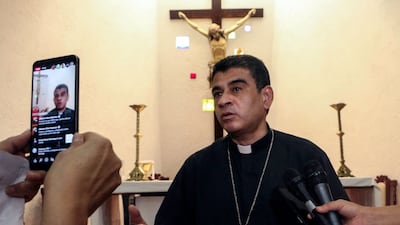A Nicaraguan court sentenced a Catholic bishop to more than 26 years in prison on Friday, a day after he declined to be expelled to the US as part of a prisoner release.
Bishop Rolando Alvarez, a critic of President Daniel Ortega, was convicted of treason, undermining national integrity and spreading false news, among other charges.
A sentence read by an appeals court judge declared Mr Alvarez, the bishop of Matagalpa diocese, to be "a traitor to the fatherland" and said he would not step out of jail until 2049.
The court also stripped the bishop of his Nicaraguan citizenship and fined him $1,600.
Mr Alvarez, 56, was born in Nicaragua but educated in Spain and the Vatican. He has been an outspoken critic of what he called restrictions on religious freedom under the Ortega government.
Originally scheduled for late March, his sentencing was brought forward without explanation.
"The Nicaraguan dictatorship's hatred of Mons Rolando Alvarez is irrational and out of control," Silvio Baez, a senior Nicaraguan bishop exiled in Miami, wrote on Twitter after the sentence was announced.
Praising Mr Alvarez's "moral high ground", Mr Baez predicted he would eventually be freed.
Mr Alvarez was included in a surprise release of more than political prisoners announced by Mr Ortega's government on Thursday, but he would not board a flight carrying them to the US capital.
In televised remarks later on Thursday, Mr Ortega described the released prisoners as criminal mercenaries for foreign powers who sought to undermine national sovereignty, and said Mr Alvarez had been returned to jail.
Police arrested the bishop in August after dislodging him from the church property where he, four other priests and two seminarians from his diocese had barricaded themselves.
A cameraman for a Catholic television channel was also arrested with them.
This month, seven of the men were sentenced to 10-year prison terms on charges of treason and spreading false news. But all of them boarded the flight to Washington on Thursday.
Mr Ortega has accused Catholic leaders of attempting to overthrow him when some served as mediators with protest groups after protests that killed about 300 people erupted in 2018.
The Catholic Church is essentially the last independent institution trusted by a large portion of Nicaraguans and that makes it a threat to Mr Ortega’s increasingly authoritarian rule.
After Mr Alvarez's arrest in August, Pope Francis called for "open and sincere" dialogue to resolve the conflict in Nicaragua. He said he was following the situation "with worry and pain".
The comments marked the pontiff's only remarks in the aftermath of the 2018 protests, and he did not mention Mr Alvarez by name.
With reporting from agencies

